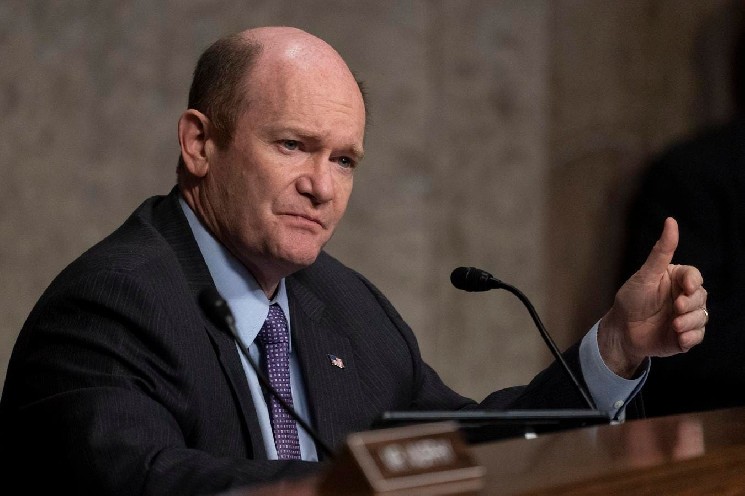Sen. Coons’ S. 4751 Could Limit Crypto Firms’ Ability To Challenge SEC

In July 2024, the U.S. Supreme Court’s decision in Corner Post, Inc. v. Board of Governors of the Federal Reserve System expanded the ability of plaintiffs to sue federal agencies. The Court ruled that the statute of limitations to challenge an agency action starts when the plaintiff is harmed, not when the action occurs.
Justice Amy Coney Barrett’s decision extended the timeframe for companies to file lawsuits against regulations, allowing challenges long after the rules are issued. However, Senate bill 4751, the Agency Stability Restoration Act of 2024, sponsored by Sen. Chris Coons (D-DE), aims to limit this by setting a strict six-year statute of limitations from the date of the agency action, regardless of when harm occurs. Co-sponsors of the bill include Senators Dick Durbin (D-IL), Richard Blumenthal (D-CT), Mazie Hirono (D-HI), Cory Booker (D-NJ), Peter Welch (D-VT), and Sheldon Whitehouse (D-RI).
For the crypto industry, which has long been at odds with the Securities and Exchange Commission (SEC) under Chair Gary Gensler in particular, the bill could significantly impact its legal strategy. The industry’s ability to challenge SEC enforcement under the Administrative Procedure Act (APA) often hinges on demonstrating harm from the agency’s actions. If passed, the Act would require these challenges to happen quickly, potentially before the full effect of regulations is known.
The Corner Post Decision: Broadening The Right To Challenge
In Corner Post, a North Dakota truck stop challenged a 2011 Federal Reserve rule on debit card fees, even though it didn’t open until 2018. The key issue was whether the six-year statute of limitations started in 2011, when the rule was issued, or in 2018, when the business was affected. In a 6-3 decision, the Supreme Court ruled the clock starts only when the plaintiff suffers harm.
Justice Barrett, writing for the majority, called the case “straightforward,” explaining that a claim under the APA doesn’t begin until there’s a “complete and present cause of action.” Critics, like The Center for Progressive Reform, fear this decision will lead to lawsuits long after a rule is enacted, but Barrett argued that more time to sue doesn’t guarantee success.
In dissent, Justice Ketanji Brown Jackson, joined by Justices Sotomayor and Kagan, also warned of “staggering” consequences. She argued the ruling effectively erases meaningful statutes of limitations for challenging regulations, risking a flood of lawsuits against even long-standing rules, which could undermine government functioning.
For businesses, including those in the crypto industry, Corner Post could be seen as a win, allowing them greater flexibility to challenge older regulations as they feel the impact. However, this flexibility could end with the S. 4751.
The Agency Stability Restoration Act: Reversing Legal Flexibility
S. 4751aims to reinstate a strict six-year statute of limitations for challenging agency rules, starting from the date the rule is finalized. This change would prevent businesses from delaying lawsuits until they are harmed, instead requiring them to act within the six-year window following the rule’s issuance.
For the crypto industry, which has often found itself in prolonged battles with the SEC over digital asset regulation, the Act could complicate legal strategies. SEC Chair Gary Gensler has taken an aggressive approach, often relying on enforcement actions to interpret how existing securities laws apply to cryptocurrencies rather than issuing clear rules. This has led to what some companies view as punitive enforcement for behaviors that weren’t explicitly prohibited at the time.
Currently, crypto firms can challenge SEC actions whenever they experience harm, even if years after a rule was issued. Under the new Act, they would need to file lawsuits within six years of a rule’s publication, regardless of when they are directly affected.
Implications For The Crypto Industry’s Legal Strategy
The passage of S. 4751 could force the crypto industry to significantly rethink its approach to legal challenges involving SEC regulations. By narrowing the window for lawsuits, the Act could increase pressure on businesses to act quickly, which could have several key impacts:
Faster Litigation: The Act could compel crypto companies to file lawsuits preemptively, even before they fully understand how a rule impacts their business. This may lead to a surge in litigation based on potential harms rather than actual injuries, creating legal risks if cases are deemed premature. For example, Consensys sued the SEC preemptively, challenging what the company argues is regulatory over-reach and demanding regulatory clarity.
Limited Long-Term Challenges: By enforcing a six-year statute of limitations, the Act would prevent challenges to older regulations that may still affect companies. This limitation could be particularly problematic for businesses that need more time to assess the full consequences of SEC rules. Previously, under the Corner Post ruling, the window to sue opened only when harm was experienced; now, the clock would start immediately after the rule is issued.
Impact on Innovation: Facing a rigid timeframe for legal challenges, companies may feel pressured to file lawsuits without fully understanding the long-term effects of a regulation. This could stifle innovation, particularly for smaller startups that lack the resources to engage in constant legal battles. The combined pressure from the SEC’s aggressive enforcement tactics and the restrictions of the new Act could heighten these risks.
More Aggressive SEC Enforcement: With companies needing to act within a specific timeframe, the SEC might ramp up its enforcement actions. Coupled with recent court rulings limiting the deference given to agency interpretations of their own rules, the crypto industry could face an increase in lawsuits, while the SEC moves more aggressively within the six-year window.
A Silver Lining?: Regulatory Certainty
While the Agency Stability Restoration Act poses challenges, some argue that it could bring regulatory certainty. By establishing a clear timeframe for legal challenges, businesses may find it easier to navigate compliance and avoid the threat of lawsuits decades after a rule is issued.
For the broader financial system, including the crypto industry, having a defined period for legal challenges offers clear parameters for compliance and business planning. Rather than living with the uncertainty of open-ended lawsuits, companies can operate with a better sense of the rules and how long they will remain stable.
This regulatory certainty could also encourage earlier and more proactive engagement with regulators. By engaging sooner, companies might help shape clearer, more appropriate rules, potentially reducing the need for litigation down the road.
A Balanced Middle Ground?
To balance the need for regulatory certainty with the realities of industries like crypto, which often face evolving regulations, a more nuanced approach might include:
- Tiered Statute of Limitations: A shorter timeframe (3-4 years) for procedural challenges, and a longer period (8-10 years) for lawsuits based on actual harm experienced.
- Clear Guidelines from Agencies: Agencies like the SEC could issue clearer guidelines and create safe harbors to protect companies that act in good faith from retroactive enforcement actions.
- Pre-Enforcement Review: Implementing a review mechanism before rules take effect could allow industries to provide input on potential impacts before compliance becomes mandatory.
- Sunset Provisions: Regulations could include mandatory reviews after a set period (e.g., 5-7 years) to reassess their relevance and impact on industries like digital assets.
- Alternative Dispute Resolution (ADR): An ADR mechanism could offer a quicker, less costly way to resolve regulatory disputes without involving lengthy litigation.
This balanced approach could provide regulatory certainty while allowing time for innovative industries like digital assets to adapt, challenge, and collaborate on regulations that impact their growth.
S. 4751, if ultimately enacted, could dramatically change the legal landscape for the crypto industry by limiting the window for challenging SEC actions. If passed, companies will need to act quickly to protect their interests, which could increase legal costs and stifle innovation. As the industry continues to battle against regulation by enforcement, the need for clear, forward-thinking regulations is more urgent than ever.




 Bitcoin
Bitcoin  Ethereum
Ethereum  Tether
Tether  USDC
USDC  Dogecoin
Dogecoin  TRON
TRON  Cardano
Cardano  Bitcoin Cash
Bitcoin Cash  Chainlink
Chainlink  LEO Token
LEO Token  Litecoin
Litecoin  Dai
Dai  Monero
Monero  Ethereum Classic
Ethereum Classic  Stellar
Stellar  Stacks
Stacks  OKB
OKB  Cronos
Cronos  Hedera
Hedera  Cosmos Hub
Cosmos Hub  Theta Network
Theta Network  KuCoin
KuCoin  Gate
Gate  Algorand
Algorand  Maker
Maker  Polygon
Polygon  NEO
NEO  EOS
EOS  Tether Gold
Tether Gold  Tezos
Tezos  Zcash
Zcash  TrueUSD
TrueUSD  Synthetix Network
Synthetix Network  IOTA
IOTA  Bitcoin Gold
Bitcoin Gold  Holo
Holo  0x Protocol
0x Protocol  Zilliqa
Zilliqa  Dash
Dash  Siacoin
Siacoin  Enjin Coin
Enjin Coin  Ravencoin
Ravencoin  Basic Attention
Basic Attention  Qtum
Qtum  Decred
Decred  Ontology
Ontology  NEM
NEM  Lisk
Lisk  Nano
Nano  Numeraire
Numeraire  Pax Dollar
Pax Dollar  DigiByte
DigiByte  Waves
Waves  Status
Status  Hive
Hive  Huobi
Huobi  Steem
Steem  BUSD
BUSD  Ren
Ren  OMG Network
OMG Network  Bitcoin Diamond
Bitcoin Diamond  Bytom
Bytom  Kyber Network Crystal Legacy
Kyber Network Crystal Legacy  HUSD
HUSD